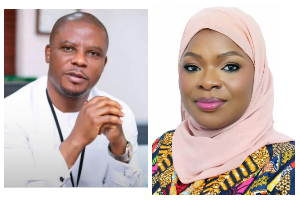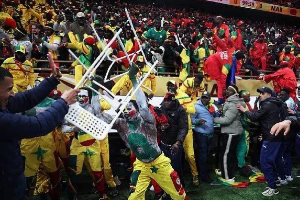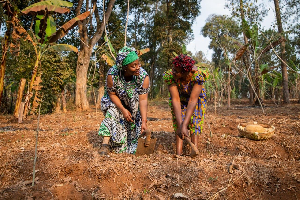After much acrimony that vital development priorities should take importance over a new seat of government by opposition political parties and some section of the media, a new seat of government, called the Golden House Jubilee, has been built.
On the balance, while the row over the Golden Jubilee House was understandable, the need for a new seat of government out of the colonially 16th century built Osu Castle (also known as Fort Christiansborg) goes beyond the physical to the metaphysical. The metaphysical implications of managing Ghana's business in a building ridden with slavery and agony, bloodshed, immorality, massive juju-marabou rituals, mindless military coups and threatening one-party systems, unGhanaian behavior, and general evil deeds was unimaginable.
No doubt, the ruling National Patriotic Party (NPP) argued that "the President [John Kufour] should not be based in the Osu Castle - where slaves used to be kept." The opposition parties thought it was absurd for Ghana to take a US$30 million loan from India to build a new presidential palace in the face of poverty and other pressing development concerns.
But the other argument was that it is equally spiritually bankrupt and unGhanaian to have a seat of government in a building ridden with long-running evil deeds, suffering and deformed thoughts.
The unspoken views in favour of the Golden Jubilee House was seen through the Parliament of Ghana that approved the Indian loan: that the work of the parliament isn’t only to enact legislations to solve physical problems - food, water, domestic violence, gender inequality, human rights - but also look after the sacred wellbeing of its citizens. This is authentic Ghanaian traditional thought. Depending on the spiritual problems of the state, such as the agonizing slave trade with its shame, pains, deaths, bloodshed and betrayals, the vocation of a national parliament is also to oversee the spiritual health of its citizens.
By mentioning slave trade, a massive evil activity, and by extension its spiritual nuances, as one of the reasons for thinking of building the Golden Jubilee House for current and future governments, the Ghanaians revealed the dawn of not only enlightenment in Ghana's progress but also Ghana’s rebirth and attempts to grapple with the spiritual allusion of the slave trade.
Attempts to heal the moral and spiritual wrongs at the Osu Castle and appease the spirits of those killed and hurt there is in line with Ghanaian/African cosmology. African thinkers and spiritualists such as Zambia's Roman Catholic Archbishop, Emmanuel Milingo, have time after time argued that some of Africa’s predicaments may be as a result of imbalances in her cosmology - that's imbalances between the physical and the metaphysical.
African spirituality wheels around a balance between the physical and the metaphysical in order to progress. The Golden Jubilee House, for largely morally reasons, are reflected in Milingo's suggestion to donor agencies (as the US$30 million Indian loan might demonstrate) and other international development organizations working in Africa to look at the balance between the physical and the metaphysical aspect of Africa's tradition when planning development strategies.
So eight years into the last leg of his presidency, President Kufuor, is indirectly telling Ghanaians why he has resisted living at the depressive Osu Castle. This is not only because of what slave trade and colonialism did inside the Osu Castle but also what some post-independent Ghanaian Heads of State did there: all sorts dreadful sacrifices, fearful juju-marabou rituals, brutalities, killings, unfreedoms, chaos, and gross inhumanity.
Some Ghanaians who know the Osu Castle pretty well say the basement of the Osu Castle is splashed with blood, apparently in some dreadful rituals. Either for its spiritual allegations almost eight years in office, President Kufuor resides in his own private house in Accra and drives to his offices at the Osu Castle for state businesses.
Having moved Ghanaian governments to the new Golden Jubilee House, freed from the evil deeds and negativities of centuries past, the Osu Castle, a grim dark wound of indignity, could be used as a national museum, a national memorial, as a civilizing place that would deepen the ideas of inhumanity, unfreedom and massive evil conducts. It would bring peace, freedoms and human rights to the soul of Ghana, and help brighten, a bit, the “The Black Star of Africa.”
Ghanaians need a broad moral and spiritual decontamination, the traditional idea of Ghana itself as balanced in her cosmology as the last best hope in Africa’s progress. The Osu Castle has been spiritually deranged place to run state affairs.
The Golden Jubilee House brings poise and spiritual relief to run state affairs in the face of Ghana’s growing democracy and increasing national consciousness driven simultaneously by Ghanaian traditional values and the neo-liberal ideals running Ghana.
Opinions of Thursday, 27 November 2008
Columnist: Akosah-Sarpong, Kofi














